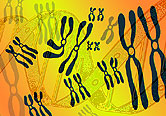
WEDNESDAY, May 26 (HealthDay News) — A team of cardiologists and geneticists have identified a genetic mutation that appears to strongly raise the risk for congenital heart disease, the most common major birth defect.
Congenital heart disease (CHD), is the “Wild West” of genetics, rarely explored compared to diseases like cancer, according to study author Dr. Peter J. Gruber, a pediatric cardiothoracic surgeon and developmental biologist at The Children’s Hospital of Philadelphia.
“This gene, ISL1, plays a key role in regulating early cardiac development, so there is a compelling biological reason for investigating it as a genetic risk factor for CHD,” said Gruber in a news release.
Congenital heart disease strikes at least one in every 100 births, the authors note, and ranges in severity. In some cases, tiny holes that close up naturally are formed between heart chambers. In other instances, the situation is life-threatening and can require surgery.
“Instead of assuming separate genes would govern each specific defect, we formed the hypothesis that a common gene variant operates early in the biological pathway of heart formation,” thus affecting many subtypes of congenital heart disease, Gruber explained.
Noting that his own prior research had shown that the ISL1 gene — a genetic variation on chromosome 5 — is involved in heart cell development, Gruber and his team set out to collect DNA samples from 1,344 children with congenital heart disease and 6,135 healthy children.
A subsequent analysis confirmed that variants in the ISL1 gene, in fact, did have a strong association with congenital heart disease.
“A greater understanding of molecular events in early development brings us that much closer to personalized medicine,” Gruber noted, suggesting that the finding may eventually lead to improved surgical interventions down the road.
Gruber joined co-author and sibling Dr. Stephen B. Gruber — a geneticist and epidemiologist at the University of Michigan Medical School — to report the finding in the current online issue of the journal Public Library of Science One.
More information
For more on congenital heart disease, visit the U.S. National Institutes of Health.

